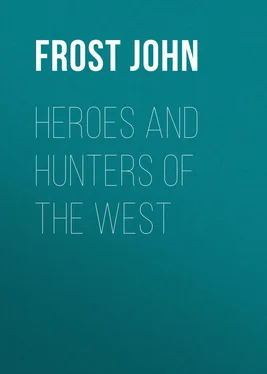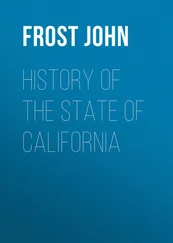John Frost - Heroes and Hunters of the West
Здесь есть возможность читать онлайн «John Frost - Heroes and Hunters of the West» — ознакомительный отрывок электронной книги совершенно бесплатно, а после прочтения отрывка купить полную версию. В некоторых случаях можно слушать аудио, скачать через торрент в формате fb2 и присутствует краткое содержание. Жанр: foreign_antique, foreign_prose, на английском языке. Описание произведения, (предисловие) а так же отзывы посетителей доступны на портале библиотеки ЛибКат.
- Название:Heroes and Hunters of the West
- Автор:
- Жанр:
- Год:неизвестен
- ISBN:нет данных
- Рейтинг книги:5 / 5. Голосов: 1
-
Избранное:Добавить в избранное
- Отзывы:
-
Ваша оценка:
- 100
- 1
- 2
- 3
- 4
- 5
Heroes and Hunters of the West: краткое содержание, описание и аннотация
Предлагаем к чтению аннотацию, описание, краткое содержание или предисловие (зависит от того, что написал сам автор книги «Heroes and Hunters of the West»). Если вы не нашли необходимую информацию о книге — напишите в комментариях, мы постараемся отыскать её.
Heroes and Hunters of the West — читать онлайн ознакомительный отрывок
Ниже представлен текст книги, разбитый по страницам. Система сохранения места последней прочитанной страницы, позволяет с удобством читать онлайн бесплатно книгу «Heroes and Hunters of the West», без необходимости каждый раз заново искать на чём Вы остановились. Поставьте закладку, и сможете в любой момент перейти на страницу, на которой закончили чтение.
Интервал:
Закладка:
Jesse Hughes
Jesse Hughes was born and reared in Clarksburgh, Harrison county, Virginia, on the head-waters of the Monongahela. He was a light-built, active man, and from his constant practice became one of the best hunters and Indian fighters on the frontier. Having a perfect knowledge of all the artifices of the Indians, he was quick to devise expedients to frustrate them. Of this, the following exploit is an illustration. At a time of great danger from Indian incursions, when the citizens in the neighborhood where in a fort at Clarksburgh, Hughes one morning observed a lad very hurriedly engaged in fixing his gun.
“Jim,” said he, “what are you doing that for?”
“I am going to shoot a turkey that I hear gobbling on the hill side,” replied Jim.
“I hear no turkey,” said Hughes.
“Listen,” said Jim. “There, didn’t you hear it? Listen again!”
“Well,” said Hughes, after hearing it repeated, “I’ll go and kill it.”
“No you won’t. It’s my turkey. I heard it first,” said Jim.
“Well,” said Hughes, “but you know I am the best marksman; and besides, I don’t want the turkey, you may have it.”
The lad then agreed that Hughes should go and kill it for him. Hughes went out of the fort on the side that was farthest from the supposed turkey, and running along the river, went up a ravine and came in on the rear, where, as he expected, he saw an Indian, sitting on a chestnut stump, surrounded by sprouts, gobbling and watching to see if any one would come from the fort to kill the turkey. Hughes crept up and shot him dead. The successful ranger then took off the scalp, and went into the fort, where Jim was waiting for the prize.
“There, now,” said Jim, “you have let the turkey go. I would have killed it if I had gone.”
“No,” said Hughes, “I didn’t let it go,” and he threw down the scalp. “There, take your turkey, Jim; I don’t want it.”
The lad nearly fainted, as he thought of the death he had so narrowly escaped, owing to the keen perception and good management of Mr. Hughes.
The sagacity of our border hero was fully proved upon another occasion. About 1790, the Indians visited Clarksburgh, in the night, and contrived to steal a few horses, with which they made a hasty retreat. About daylight the next morning, a party of twenty-five or thirty men, among whom was Jesse Hughes, started in pursuit. They found a trail just outside of the settlement, and from the signs, supposed that the marauding party consisted of eight or ten Indians. A council was held to determine how the pursuit should be continued. Mr. Hughes was opposed to following the trail. He said he could pilot the party to the spot where the Indians would cross the Ohio, by a nearer way than the enemy could go, and thus render success certain. But the captain of the party insisted on following the trail. Mr. Hughes then pointed out the dangers of such a course. Suddenly, the captain, with unreasonable obstinacy, called aloud to those who were brave to follow him and let the cowards go home. Hughes knew the captain’s remark was intended for him, but smothered his indignation and went on with the party.
They had not pursued very far when the trail went down a drain, where the ridge on one side was very steep, with a ledge of rocks for a considerable distance. On the top of the cliff, two Indians lay in ambush, and when the company got opposite to them, they made a noise, which caused the whites to stop; that instant two of the company were mortally wounded, and before the rangers could get round to the top of the cliff, the Indians made their escape with ease. This was as Hughes had predicted. All then agreed that the plan rejected by the captain was the best, and urged Hughes to lead them to the Ohio river. This he consented to do, though fearful that the Indians would cross before he could reach the point. Leaving some of the company to take care of the wounded men, the party started, and arrived at the Ohio the next day, about an hour after the Indians had crossed. The water was yet muddy in the horses’ trails, and the rafts that the red men had used were floating down the opposite shore. The company was now unanimous for returning home. Hughes said he wanted to find out who the cowards were. He said that if any of them would go with him, he would cross the river, and scalp some of the Indians. Not one could be found to accompany the daring ranger, who thus had full satisfaction for the captain’s insult. He said he would go by himself, and take a scalp, or leave his own with the savages. The company started for home, and Hughes went up the river three or four miles, then made a raft, crossed the river, and camped for the night. The next day, he found the Indian trail, pursued it very cautiously, and about ten miles from the Ohio, came upon the camp. There was but one Indian in it; the rest were all out hunting. The red man was seated, singing, and playing on some bones, made into a rude musical instrument, when Hughes crept up and shot him. The ranger then took the scalp, and hastened home in triumph, to tell his adventures to his less daring companions.
Siege of Fort Henry
The siege of Fort Henry, at the mouth of Wheeling creek, in the year 1777, is one of the most memorable events in Indian warfare – remarkable for the indomitable bravery displayed by the garrison in general, and for some thrilling attendant incidents. The fort stood immediately on the left bank of the Ohio river, about a quarter of a mile above Wheeling creek, and at much less distance from an eminence which rises abruptly from the bottom land. The space inclosed was about three quarters of an acre. In shape the fort was a parallelogram, having a block-house at each corner with lines of pickets eight feet high between. Within the inclosures was a store-house, barrack-rooms, garrison-well, and a number of cabins for the use of families. The principal entrance was a gateway on the eastern side of the fort. Much of the adjacent land was cleared and cultivated, and near the base of the hill stood some twenty-five or thirty cabins, which form the rude beginning of the present city of Wheeling. The fort is said to have been planned by General George Rogers Clarke; and was constructed by Ebenezer Zane and John Caldwell. When first erected, it was called Fort Fincastle but the name was afterwards changed in compliment to Patrick Henry the renowned orator and patriotic governor of Virginia.
At the time of the commencement of the siege, the garrison of Fort Henry numbered only forty-two men, some of whom were enfeebled by age while others were mere boys. All, however, were excellent marksmen, and most of them, skilled in border warfare. Colonel David Shepherd, was a brave and resolute officer in whom the borderers had full confidence. The store-house was well-supplied with small arms, particularly muskets, but sadly deficient in ammunition.
In the early part of September, 1777, it was ascertained that a large Indian army was concentrating on the Sandusky river, under the command of the bold, active, and skilful renegade, Simon Girty. Colonel Shepherd had many trusty and efficient scouts on the watch; but Girty deceived them all and actually brought his whole force of between four and five hundred Indians before Fort Henry before his real object was discovered.
Конец ознакомительного фрагмента.
Текст предоставлен ООО «ЛитРес».
Прочитайте эту книгу целиком, купив полную легальную версию на ЛитРес.
Безопасно оплатить книгу можно банковской картой Visa, MasterCard, Maestro, со счета мобильного телефона, с платежного терминала, в салоне МТС или Связной, через PayPal, WebMoney, Яндекс.Деньги, QIWI Кошелек, бонусными картами или другим удобным Вам способом.
Читать дальшеИнтервал:
Закладка:
Похожие книги на «Heroes and Hunters of the West»
Представляем Вашему вниманию похожие книги на «Heroes and Hunters of the West» списком для выбора. Мы отобрали схожую по названию и смыслу литературу в надежде предоставить читателям больше вариантов отыскать новые, интересные, ещё непрочитанные произведения.
Обсуждение, отзывы о книге «Heroes and Hunters of the West» и просто собственные мнения читателей. Оставьте ваши комментарии, напишите, что Вы думаете о произведении, его смысле или главных героях. Укажите что конкретно понравилось, а что нет, и почему Вы так считаете.










![John Bruce - The Lettsomian Lectures on Diseases and Disorders of the Heart and Arteries in Middle and Advanced Life [1900-1901]](/books/749387/john-bruce-the-lettsomian-lectures-on-diseases-and-disorders-of-the-heart-and-arteries-in-middle-and-advanced-life-1900-1901-thumb.webp)
